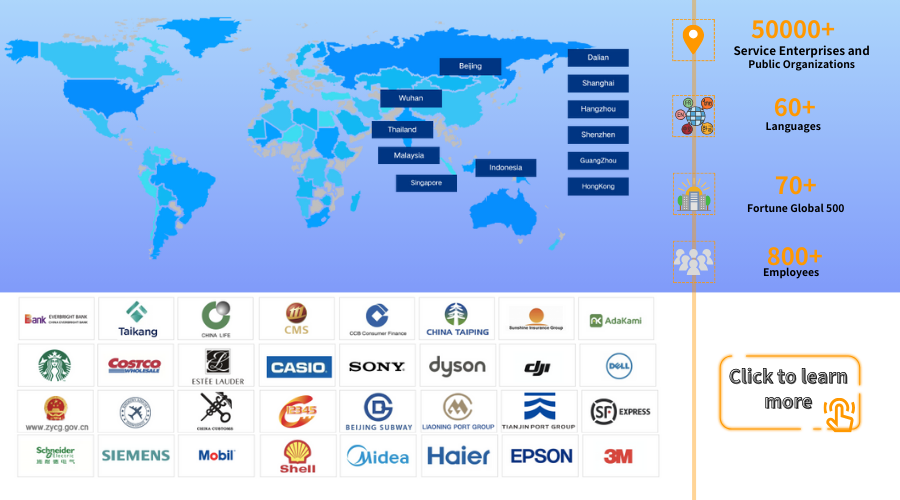In this era where "customers call the shots," enterprises compete not only on product quality but also on service speed and standards. However, have you ever encountered scenarios like these: customer service lines are always busy, WeChat inquiries go unanswered for hours, and when you finally get through, the agent has no clue about your issue… The root cause of these problems often lies in traditional
customer service systems failing to keep up with evolving customer needs. The emergence of cloud customer service systems is quietly changing all this.
I. What Exactly Is a Cloud Customer Service System? Explained in Plain Language
Simply put, a cloud customer service system is a tool that "moves customer service operations to the cloud."
Traditional customer service systems require enterprises to purchase their own servers and install software—similar to digging a private well at home: high costs and frequent risk of breakdowns. In contrast, a cloud customer service system is like "running water": enterprises don’t need to build their own computer rooms. They only need to log in via a webpage or app, allowing customer service teams to work from anywhere. Data and functions are maintained by the service provider, making it hassle-free and low-effort.
Take an example: In the past, a company’s customer service agents could only answer calls using fixed computers in the office. A power outage or system crash would "paralyze" the service. But with a cloud customer service system, agents can go online even when working from home or traveling—all they need is a smartphone or laptop. No customer messages are missed. This is the core value of cloud customer service: breaking the constraints of time and space to keep service "always online."
II. Why Are Enterprises Switching to Cloud Customer Service Systems Now? 3 Core Advantages
1. Cost-Effective! Accessible Even for Small and Medium-Sized Enterprises
Traditional customer service systems cost hundreds of thousands of yuan just for servers and maintenance staff, not to mention regular upgrades. Cloud customer service systems, however, charge "by usage"—like paying for water and electricity. Small companies can start with just a few hundred yuan per month, while large enterprises can adjust based on scale. The initial investment is nearly zero.
2. Flexible! Service Follows Customers Wherever They Are
Today, customers use countless communication channels: WeChat, Douyin, apps, webpages, phone calls… Traditional customer service systems are like "segmented railways": WeChat messages are handled by WeChat agents, calls by phone agents. If a customer switches channels to inquire, they have to re-explain their issue.
A cloud customer service system, by contrast, is like a "high-speed rail hub." It aggregates messages from all channels (WeChat messages, webpage inquiries, phone calls, etc.) into a single backend. Agents can handle all requests on one interface. For instance, if a customer first asks about an order via the app and later calls customer service, the agent can pull up the previous chat history in the system—no more asking the customer to "repeat three times."
3. Intelligent! Turning Overwhelmed Agents into Relaxed Ones
Cloud customer service systems come with a "smart assistant": AI chatbots can automatically answer simple questions (e.g., "Where is the return address?" "How long will delivery take"), while complex issues are routed to human agents. When a customer initiates contact, the system automatically pops up their order information and historical inquiry records. Agents don’t need to search for data manually—they can communicate "with answers in hand."
It’s similar to customer service for food delivery platforms: in the past, agents had to manually check order numbers, track logistics, and verify refund progress. Now the system pushes this information directly to their screens, cutting processing time by at least half.
III. What "Superpowers" Does a Cloud Customer Service System Have? 5 Functions to Solve Practical Problems
1. Omnichannel Integration: Messages Reach Agents Wherever Customers Are
Whether customers contact you via WeChat, Weibo, Douyin, app, or phone, the cloud customer service system "captures all" and displays messages uniformly on the agent workbench. For e-commerce enterprises, if a customer asks "Can I change my delivery address?" in a live stream, the message is synced directly to the customer service backend—no need for the customer to "re-submit the request in the app."
2. Intelligent Chatbots: 24/7 "Non-Stop" Service
A customer asks "How do I cancel my order?" at midnight? The AI chatbot responds with steps in seconds. Inquiry volume surges during holidays? The chatbot handles 80% of simple questions first, leaving only complex ones for human agents—avoiding long customer waits.
3. Customer Tags and Profiles: Understanding Customers Better Than They Understand Themselves
The system automatically records customer information: products purchased, past inquiries, interests in promotions… Agents can add tags to customers (e.g., "price-sensitive," "loyal customer") for precise service in future interactions. For example, if a customer mentioned "my child is 3 years old" last time, the agent can recommend "products suitable for 3-year-olds" in the next consultation.
4. Data Analysis Reports: Data Speaks for Service Quality
The system automatically tracks metrics like "customer wait time," "issue resolution rate," and "agent response speed," generating intuitive reports. Business owners don’t need to monitor agents daily—reports reveal:
- Which questions customers ask most frequently (indicating potential product description improvements);
- Which agents have the lowest efficiency (needing training).
This makes management much easier.
5. Ticket System: No "Passing the Buck" for Complex Issues
For issues requiring cross-departmental collaboration (e.g., "product quality issues needing coordination between after-sales, warehouse, and finance teams"), agents can create a "ticket." Like a courier waybill, it tracks progress, making it clear which link is delayed. This prevents customer issues from "disappearing without a trace."
IV. Which Enterprises Need Cloud Customer Service Systems Most? See If You’re on the List
Virtually any enterprise that communicates with customers can benefit from a cloud customer service system. These types of enterprises, however, have an "essential need" for it:
- E-commerce enterprises: During sales peaks like Double 11 and June 18, inquiry volume surges. Cloud customer service systems scale quickly, and the combination of chatbots and human agents prevents customer queuing.
- Financial industry: When customers ask about loans or wealth management, the system automatically links to their information—ensuring professionalism and security.
- Educational institutions: For parent inquiries about courses or refunds, the ticket system ensures every request is followed up by a dedicated person.
- Chain brands: With multiple stores and scattered customers, cloud customer service unifies service standards. Whether customers contact headquarters or a branch, the experience remains consistent.
V. What Pitfalls Should Enterprises Avoid When Choosing a Cloud Customer Service System? 3 Practical Tips
1. Don’t Focus Solely on Price—Clarify Your Needs First
Some enterprises choose a "basic version" to save money, only to find it can’t connect to their WeChat official account. Others blindly opt for an "all-in-one version," spending heavily but using less than half the functions. It’s recommended to list your needs first: Which channels need integration? Do you need an AI chatbot? Is a ticket system required? Then select a system that matches your needs.
2. Always Test the "Ease of Use"
Customer service teams vary in age and digital literacy. A overly complex system leads to high training costs. When selecting, request a trial and let agents test it:
- "How many clicks does it take to receive and reply to a customer message?"
- "Is it easy to look up customer information?"
The simpler the operation, the higher the efficiency.
3. Data Security Is More Important Than Anything
Customer service systems store a wealth of private customer data—phone numbers, orders, addresses, etc. Always choose a provider with official certifications (e.g., national Level 3 Cybersecurity Protection Certification) to ensure data is encrypted and never leaked.
VI. What Will Cloud Customer Service Systems Be Like in the Future?
With the development of AI technology, cloud customer service systems will become increasingly "smart":
- In the future, when customers send a voice message, the system will automatically transcribe it to text and identify their needs.
- If a customer repeatedly views a product on the app but doesn’t place an order, the system will prompt agents to send personalized discounts.
- It may even judge customer emotions from their tone—for example, if a customer says "I’m angry," the system will alert agents to prioritize the request.
No matter how technology evolves, the core of cloud customer service systems remains the same: helping enterprises understand customers better and making customers more satisfied.
For enterprises, adopting a cloud customer service system is like installing an "accelerator" for service: shorter customer wait times, higher agent efficiency, and naturally, increased repeat purchase rates. This is why more and more enterprises say: "We used to think cloud customer service was an ‘option,’ but now we realize it’s a ‘necessity.’"
If you want to achieve "instant responses" to customer inquiries and "one-time resolution" of issues, start by learning about cloud customer service systems—it may be the "hidden engine" for upgrading your enterprise’s service.
Udesk Omnichannel Intelligent Cloud Customer Service System integrates a cloud call center, online customer service, and ticket system on one platform. It connects to over 20 communication channels at home and abroad, enabling seamless interactions with your global customers. Build connections with customers through multiple channels to boost sales performance, improve service quality, and deliver an excellent customer experience. Gain real-time insights into customer intentions—converting leads to sales has never been easier!

 Customer Service& Support Blog
Customer Service& Support Blog


